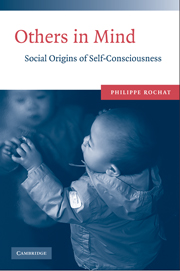Book contents
- Frontmatter
- Contents
- Foreword by Jerôme Bruner
- Preface
- Introduction: Main Ideas
- 1 Self-Conscious Species
- 2 Six Propositions
- 3 Varieties of Self-Reflective Mind State
- 4 Mind States in Development
- 5 Birth of Self-Consciousness
- 6 Shame and Self-Knowledge
- 7 The Roots of Guilt
- 8 Giving and Sharing
- 9 Origins of Owning and Sharing
- 10 Social Construction of Identity
- Conclusion: Moral Space and the Self
- Postscript Note
- References
- Index
8 - Giving and Sharing
Published online by Cambridge University Press: 05 August 2012
- Frontmatter
- Contents
- Foreword by Jerôme Bruner
- Preface
- Introduction: Main Ideas
- 1 Self-Conscious Species
- 2 Six Propositions
- 3 Varieties of Self-Reflective Mind State
- 4 Mind States in Development
- 5 Birth of Self-Consciousness
- 6 Shame and Self-Knowledge
- 7 The Roots of Guilt
- 8 Giving and Sharing
- 9 Origins of Owning and Sharing
- 10 Social Construction of Identity
- Conclusion: Moral Space and the Self
- Postscript Note
- References
- Index
Summary
Do ut des. (I give for you to give.)
Human ways of sharing form a central issue of human self-consciousness. It is a major expression of the human propensity to have others in mind. The question of interest in this chapter is, Why do we share the way we do?
Here I develop the idea that the way humans share is linked to their particular ability to reflect upon themselves, upon their situation, and in relation to others. Our unique, sophisticated ways of sharing and transacting with others are inseparable from the fact that we are a self-conscious species.
EXTERNAL MEMORY OF EXCHANGES
Humans have evolved unique social ways and, as no other species, spend much of their time accounting for exchanges. They are constantly tallying what is owed to whom. We calculate, project, and expect from others on the basis of past transactions. In the life of our species, all social exchanges are accounted for, and little is gratuitous in the long run.
Writing, which can be considered the greatest of all human inventions, emerged in modern human evolution less than 10,000 years ago, presumably as part of the tallying of exchanges. There is a consensus among prehistorians that writing as a symbolic system evolved under the pressure of keeping track of agricultural and other surplus good exchanges. Writing, as a cultural artifact, served primarily as an external memory of exchanges and transactions among individuals or groups of individuals.
- Type
- Chapter
- Information
- Others in MindSocial Origins of Self-Consciousness, pp. 130 - 154Publisher: Cambridge University PressPrint publication year: 2009



